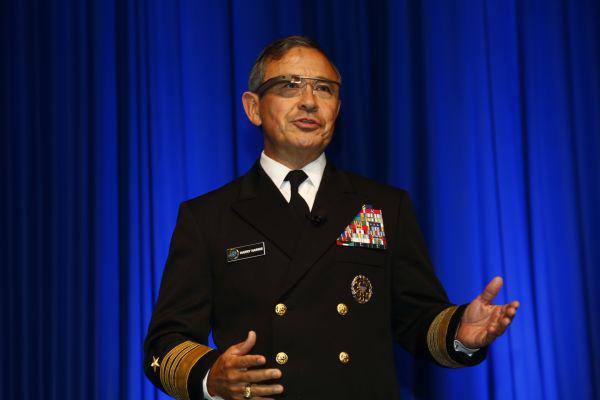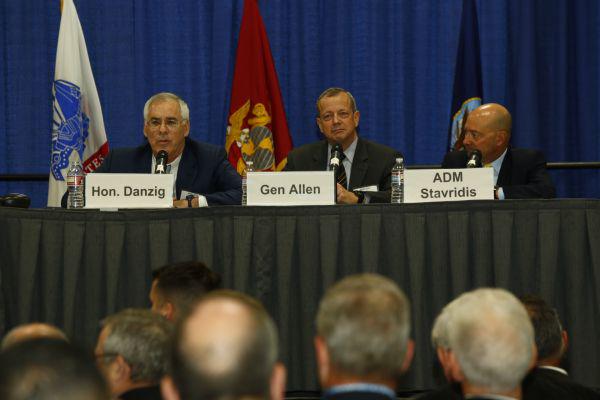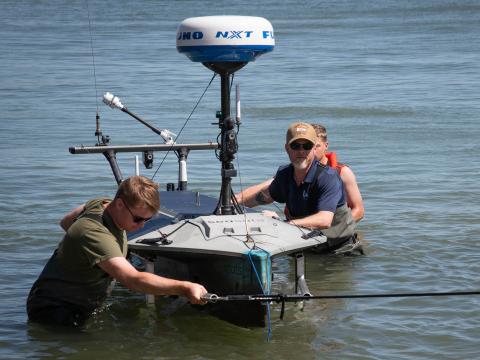Many Needs Vie for Scarce Defense Funding
West 2014 Online Show Daily, Day 1
Quote of the Day:
“If Batman had a ship, it would look like the Zumwalt-class destroyer.”—Adm. Harry B. Harris Jr., USN, commander, U.S. Pacific Fleet.
The budget reductions that will be a fact of military life for the foreseeable future promise to impel dramatic changes in force structure and military operations. Ongoing needs such as high technology and overseas commitments offer the possibility of being both challenges and solutions, as planners endeavor to plan around a smaller but, hopefully, more capable force.
The synergy of these issues was explored on the first day of West 2014, co-sponsored by AFCEA International and the U.S. Naval Institute and being held February 11-13 in San Diego. Two vibrant keynote speakers and three panels explored diverse topics that were connected by the new doctrine of peace through scarcity.
Perhaps defining the atmosphere facing the military today was the presentation by Adm. Harry B. Harris Jr., USN, commander of the U.S. Pacific Fleet. Adm. Harris began his keynote luncheon speech wearing a Google Glass headset, which was provided by SPAWAR at his request and used as a teleprompter. Adm. Harris took off the Google Glass partway into his speech and employed a tablet device for his notes. Later, he put down the tablet and read from paper notes, which he ultimately tore to pieces near the end of his talk. He said that this represented how all technologies could fail, leaving the individual sailor with the task of carrying out the mission.
Adm. Harris allowed that the Navy would be depending on industry for the information technology it would need in the future battlespace, although he added, We can’t afford to invest in every IT [information technology] innovation that industry provides.” These technologies must meet the criteria of being secure, resilient, reliable and affordable, he insisted.
He cited a need for protecting command and control in a contested environment. A commander should be able to dispatch orders in any situation and then receive a receipt from those to whom he sent the orders, the admiral said.
Adm. Harris lauded Navy shipbuilding plans, saying the Littoral Combat Ship is “an ideal ship for how we are going to be using it.” He cited the new DDG-1000 Zumwalt-class destroyer as an example of how technological innovation continued to change the Navy. “If Batman had a ship, it would look like the Zumwalt-class destroyer,” he offered.
 Christine Fox, acting deputy secretary of defense, warns of vital decisions looming that will determine the fate of the U.S. military.
Christine Fox, acting deputy secretary of defense, warns of vital decisions looming that will determine the fate of the U.S. military.The military as a whole is in a time of transition and corresponding uncertainty, said Christine Fox, acting deputy secretary of defense. The military must shrink in order to remain viable, she declared, explaining that only by reducing the force wisely could readiness be maintained.
She noted that, over the past 70 years, the U.S. military underwent a drawdown after a war several times. Each of these postwar drawdowns left a disproportionate force with deep cuts in readiness, illustrated by the hollow force of the post-Vietnam 1970s. Rebuilding the force took substantial sums of money.
Fox said the military must be active in technology and research and development across the spectrum. Decrying the approach of keeping forces at the expense of enablers, she called for more critical and innovative thinking in how to develop technology and how to keep it on the shelf. The United States must make tough and far-sighted choices now, she emphasized.
Acquisition and force structure concerns are only part of the challenge. Maintaining international commitments are paramount for the United States to continue its global role, and Afghanistan stands out among those commitments. Gen. John R. Allen, USMC (Ret.), former commander of the International Security and Assistance Force (ISAF), and Adm. James G. Stavridis, USN (Ret.), dean of the Fletcher School at Tufts University and former Supreme Allied Commander, Europe, agreed that the United States must continue its efforts or face losing Afghanistan to the Taliban.
“Often we look at Afghanistan as a photograph, but it’s not—it’s a movie,” Adm. Stavridis said. “I’m cautiously optimistic. The vectors are in the right direction,” he said of its future.
The admiral compared Afghanistan today to Columbia and the Balkans 10 years ago. Each of those two regions were in chaos, but engagement with the United States reversed the several political decline. He believes that the United States has a better–than-even chance of achieving that in Afghanistan, but only if we maintain our commitment. “The worst lesson we could draw from Afghanistan is isolationism,” he said. “The worst thing we could do is walk away from this turbulent part of the world.”
U.S. involvement with ISAF has paid dividends far beyond that part of the world. Gen. Allen related that many of the nations that took part in ISAF operations strengthened their militaries. One foreign officer told him that his country would not have advanced its military without working alongside the U.S. military for so many years. “There was a massive development of political progress as a result of this coalition among allies,” the general allowed, adding that it will go a long way toward interoperability and stability.
Coming up on the second day of West 2014: A morning keynote panel led by Dave Wennergren of CACI; a luncheon keynote address by Adm. William E. Gortney, USN, commander of U.S. Fleet Forces; and panel discussions focusing on executing strategy and regaining skills for the high end war fight.





Comments